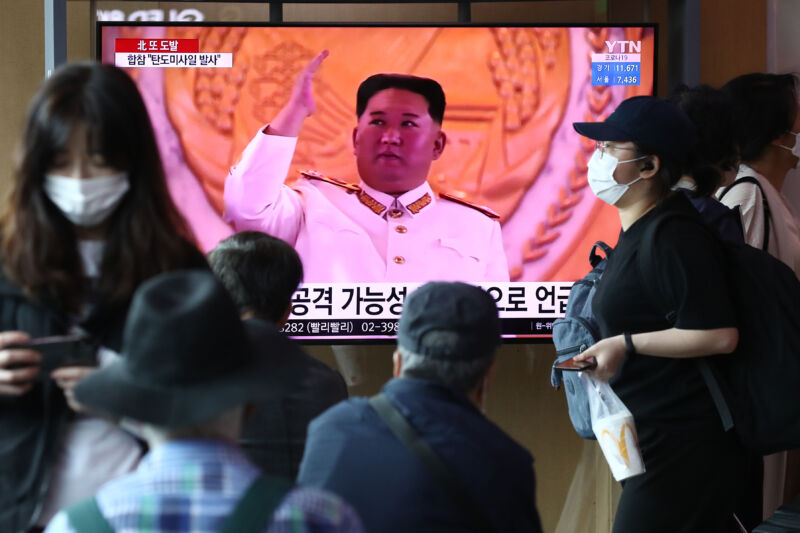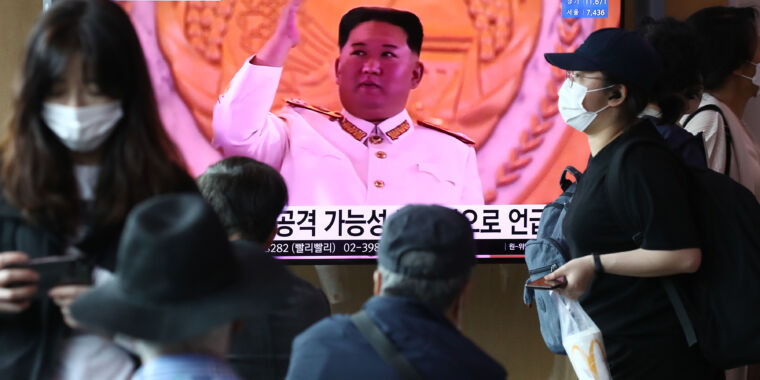
An explosive COVID-19 outbreak in North Korea has reached more than 1.7 million cases, with nearly 233,000 new cases reported on Wednesday alone, according to state media reports. It’s an astonishing increase as North Korea claimed to have zero COVID-19 cases a week ago.
But now the secretive, authoritarian country admits that the pandemic virus has spread “explosively” since late April. Many experts have interpreted the confession as a sign of a plight in the country and a plea for international aid. North Korea has a weak health care system and many of its people are malnourished due to an ongoing food crisis. In addition, the country has previously avoided offers of vaccines from the United Nations-backed COVAX program and China, leaving the population unvaccinated.
After North Korea first acknowledged the outbreak last Thursday, South Korea offered aid, including vaccines. But North Korea has reportedly not responded. But the country may have accepted help from its closest ally, China. According to unnamed diplomats speaking to The Wall Street Journal, three North Korean cargo planes flew into the Chinese city of Shenyang on Monday and returned the same day with basic medical supplies.
In the meantime, North Korean leader Kim Jong-un has openly chastised his country’s response, while state media reported a rosy picture. In a politburo meeting on Tuesday, Kim criticized the “immaturity in the state’s ability to cope with the crisis” and blamed the poor response on the “unpositive attitude, laxity and inactivity” of officials. according to KCNA.
Still, the report said officials discussed “maintaining good odds on the general front of epidemic prevention” and that the situation was taking “a sustained favorable turn.”
WHO was concerned?
Outside health experts are not so optimistic. In a press conference on Tuesday, World Health Organization director general Tedros Adhanom Ghebreyesus expressed concern about the spread of disease, lack of data and refusals of aid.
“WHO is deeply concerned about the risk of further spread of COVID-19 in [North Korea]especially because the population is unvaccinated and many have underlying conditions that put them at risk of serious illness and death,” Tedros said. “The WHO has requested the Democratic People’s Republic of Korea to share data and information, and the WHO has offered a package provide technical support and supplies, including diagnostic tests, essential drugs and vaccines ready for deployment in the country.” So far, North Korea has not taken up the offer from WHO.
North Korea has reported 62 deaths, according to state media reports. Outside experts expect 62 deaths to be significantly less than the actual total, given the high number of cases recognized by the government. But that number is also questionable, as the country lacks testing resources. Currently, cases are counted based on unexplained fever. People infected with the coronavirus who are asymptomatic, only mildly ill or have no fever may not be counted, making the 1.7 million potentially a huge underestimate.
Health experts also worry that North Korea’s uncontrolled spread of the virus could make it a breeding ground for new variants. “Where you have uncontrolled transmission, there is always a higher risk of new variants emerging,” Mike Ryan, executive director of the WHO’s health emergency program, said in the news conference. Vaccines will save lives, reduce hospitalizations and suppress transmission, but they also work “to keep the virus under pressure so we don’t see the same evolution,” he said.

